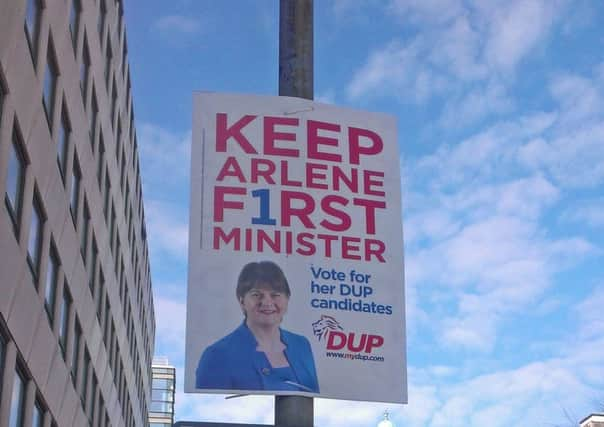Sam McBride: Hidden in full view, the old political order is changing


But even as recently as five years ago, the DUP was fighting an Assembly election campaign which was as much about protecting its right flank from Jim Allister with the grim warning that only Peter Robinson could keep Martin McGuinness from becoming First Minister.
Electorally, it was brilliant strategy which brought the DUP thousands of extra votes, something which could be quantified because council elections took place on the same day.
Advertisement
Hide AdAdvertisement
Hide AdAt first glance little has changed since then – the DUP has a new leader but its message is barely distinguishable from the ‘vote Robinson to stop McGuinness’ mantra. Posters proclaiming ‘Keep Arlene First Minister’ appeared in Belfast city centre yesterday and Nigel Dodds has warned of “chaos” if she does not win the election.
But behind that rhetoric the political orbit has changed radically in that period and there is evidence that this may be the final fling – at least for some time – for that sort of politics.
This is now the third consecutive election campaign in which the most significant exchanges have not been on constitutional issues or traditional battlegrounds such as parading. Instead, they have been on socio-economic issues, especially gay marriage and abortion. None of the four biggest parties are as sure-footed on this new territory as they are on the old areas of controversy. And even Alliance – which on paper supports same-sex marriage and takes no position on abortion – has faced internal strains about these issues.
A year ago, a weakened Peter Robinson tentatively moved the DUP to the brink of giving its MLAs a free vote on abortion – something which would effectively mean that the party has no policy – but drew back after internal dissent.
Advertisement
Hide AdAdvertisement
Hide AdIf Mrs Foster emerges strongly from this election she may be in a position to do what Mr Robinson could not.
There is certainly evidence in the DUP manifesto of a continued subtle change in the party’s priorities – even though it is not always apparent in how many of the party’s representatives come across in public.
In the substantial document, there is just one brief sentence on ‘parades and protests’ and no reference at all to abortion – despite these issues being among the most divisive political debates over the last Assembly term and something which is certain to be a major issue in the next Assembly term.
The DUP was once very comfortable discussing these matters. Indeed, as recently as 2007, the party leadership used them as a carrot to ensure that the ‘old guard’ (some of whom are not in fact old) would support the decision to share power with Sinn Fein.
Advertisement
Hide AdAdvertisement
Hide AdStormont, they were told, would be a bulwark against the sort of social changes which would be introduced over their heads by Westminster – abortion and sexual orientation regulations (even as recently as a decade ago, gay marriage was barely on the horizon).
Any weakening of the party’s stance on these issues could see people who swallowed hard at the prospect of sharing Stormont Castle with Mr McGuinness decide to walk away. And, if they leave, the DUP’s transformation into the Ulster Unionist Party could accelerate.
Within unionism, it is not just the DUP which faces strains on these issues.
In a 2013 interview with Ulster Unionist leader Mike Nesbitt, I asked him about the policies of Nigel Lutton, the then unionist unity candidate in a by-election.
Advertisement
Hide AdAdvertisement
Hide AdSomewhat dismissively, Mr Nesbitt replied: “I don’t think you’ve ever had a situation in Northern Ireland where people vote for a particular candidate because of their position on abortion, gay marriage, euthanasia, the death penalty. I think people have tended over the years to vote orange and green.”
Despite the fact that the UUP sidesteps many of these debates by giving its members a vote in line with their conscience, last year one of Mr Nesbitt’s Fermanagh councillors, Raymond Farrell, quit after saying that he had become disillusioned by what he saw as its increasingly “dangerous” liberal stance on social issues.
But although the public caricature is often that of obstinate unionists blocking change, the reality is more complex. The nationalist parties face considerable pressure on these issues, particularly on abortion.
Last year a pro-life group claimed that its direct campaigning against Sinn Fein on the issue of abortion had cost Michelle Gildernew her seat in Fermanagh-South Tyrone.
Advertisement
Hide AdAdvertisement
Hide AdOf course, lots of people claim lots of things and it is impossible to prove whether that campaign had any significant bearing on the election.
But the fact is that – already facing the SDLP, disparate dissident republican types (not all of whom support violence) and growing left wing dissenters such as People Before Profit – Sinn Fein now faces a new and highly motivated opponent.
That has been greatly evident again in this election. As the News Letter reported on Tuesday, tens of thousands of leaflets are being distributed in the west of the Province by pro-life groups. Of the major parties likely to be in contention for seats, the leaflets explicitly target Sinn Fein and the Alliance Party on the issue of abortion.
In recent days the words ‘SF baby killers’ have appeared at Ballygawley roundabout, and on bridges between there and Dungannon. In coming years – particularly given Sinn Fein’s support for the growing campaign to repeal the eighth (pro life) amendment to the Republic’s constitution – the party is likely to face increased pressure from both sides of the debate.
Advertisement
Hide AdAdvertisement
Hide AdThis has been a quiet election campaign and, on the surface, Northern Ireland politics may seem becalmed. But just under the surface there are clear signs of change. If relative peace persists and the current overwhelming support for the Union remains, the future will be very different from the past.